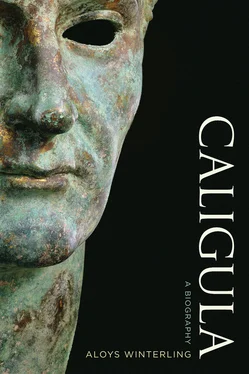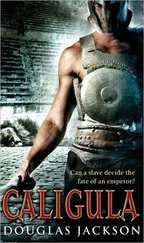As Pompey’s case shows, the most painful humiliations for the aristocracy undoubtedly occurred in personal contact with the emperor. Philo reports that even though everyone suffered from Caligula’s actions, people still continued to flatter him. Among the guests at the emperor’s last banquet in early 41 was Quintus Pomponius Secundus, one of the sitting consuls and a half brother of the empress Caesonia. According to Cassius Dio, Secundus sat at the emperor’s feet — like a slave — during the meal and “kept bending over continually to shower kisses upon them” (Dio 59.29.5). Suetonius recounts that when the emperor dined in the evening sometimes a few senators who had occupied the highest offices would stand at the head or foot of his couch dressed in short linen tunics: that is, comporting themselves in the manner of his personal slaves.
Thus the forms of debasement suffered in personal contact with the emperor began with voluntary, submissive, individual acts; when Caligula did not discourage these, everyone else was obliged to imitate them. This was not a new phenomenon. Tacitus used strong language to characterize aristocrats’ opportunistic behavior under Augustus and Tiberius and, as we have seen, they acted no differently under Caligula even before the autumn of 40. Now, however, the emperor began to demand self-abasing behavior from them. Dio writes that to most senators he offered his hand or foot to kiss but did not kiss them in return — an act that would have symbolized equality in rank. In one hate-filled passage, Seneca describes an incident in which a consular wished to thank Caligula for saving his life; clearly he had been denounced, and he may have been the lover of Quintilia. The emperor held out his left foot to be kissed, and this man, who had held the highest offices in Rome, prostrated himself and kissed the emperor’s foot in the presence of the leaders of the Senate. Caligula further subverted the traditions of the social hierarchy by offering the honor of his kiss in public to favorites whose official rank was far below the senators’, such as the well-known actor Mnester.
The reaction of aristocrats to their ceremonial degradation is illustrated by Dio’s report that those senators who were granted the exceptional honor of a kiss from the emperor thanked him in speeches in the Senate. The submissiveness continued, in other words. But Caligula went further in using his contacts with the aristocracy to humiliate specific individuals. All the sources mention his rhetorical talent and his quick wit, and we have noted his fondness for cynical jokes.
A sense of the horror aroused by Caligula’s presence among senators forced into submissive behavior has been preserved in various accounts: “Amid the multitude of his other vices,” writes Seneca, Gaius Caesar “had a bent for insult” and “was moved by the strange desire to brand every one with some stigma.” Seneca immediately gave him a taste of his own medicine by describing his appearance: “Such was the ugliness of his pale face bespeaking his madness, such the wildness of his eyes lurking beneath the brow of an old hag, such the hideousness of his bald head with its sprinkling of beggarly hairs. And he had, besides, a neck overgrown with bristles, spindle shanks, and enormous feet” (Sen. De Const. Sap . 18.1). According to Suetonius, Caligula’s face “was naturally forbidding and ugly,” but “he purposely made it even more savage, practicing all kinds of terrible and fearsome expressions before a mirror” (Suet. Cal . 50.1).
It cannot be verified whether Caligula’s feet were in fact enormous or whether he used a mirror to practice making horrible faces. Here again, remember that the behavior described as illustrating the emperor’s character can belong only to the time after he returned to Rome in the autumn of 40. Josephus and Dio’s accounts show that up to the time of the consulars’ conspiracy he had treated the aristocracy courteously, and after the great conspiracy he had spent a year away from Rome. The fears that he inspired in senators from then on, and his consistent efforts to humiliate them, thus formed part of a conscious new strategy. Much of it, especially the insults directed at individuals, should probably be ascribed to the emperor’s desire to take personal revenge and should be taken as his response both to the events of the previous year and to the most recent conspiracy. But Caligula’s remarks on the emperor’s paradoxical position of honor within the senatorial class show that his goal went even further: His aim was to destroy the aristocratic hierarchy as such and expose it to ridicule.
THE EMPEROR AS “GOD”
Lucius Vitellius, Suetonius reports, “was the first to begin to worship Gaius Caesar as a god; for on his return from Syria he did not presume to approach the emperor except with veiled head, turning himself about and then prostrating himself” (Suet. Vit . 2.5). The father of the later emperor had presumably been replaced as governor of Syria at the beginning of the year and then must have feared for his life. Dio provides more details. In order to save his life, Vitellius dressed as a man of lower rank than he actually was, threw himself at the emperor’s feet, addressed him with many divine names, prayed to him, and finally vowed that he would offer sacrifices to him. In other words, in Caligula’s presence Vitellius performed a ritual combining an element of Roman cultic practice (veiling the head) with the custom known in the Hellenic world and the East of prostrating oneself before a divine ruler ( proskynēsis ). He started a trend.
After Caligula released Pomponius, Dio relates, the senators praised him “partly out of fear and partly with sincerity,” some calling him a demigod (Greek hērōs ) and others a god (Dio 59.26.3–5). They didn’t stop there. In accord with a decree of the Senate a temple was built to the emperor; he was to be worshiped there as divine. A college of priests was founded to take charge of the emperor’s worship. “The richest citizens used all their influence to secure the priesthoods of his cult and bid high for the honor” (Suet. Cal . 22.3). Dio writes that “these honors paid to him as a god came not only from the multitude, accustomed at all times to flattering somebody, but from those also who stood in high repute” (Dio 59.27.3). What had happened to the senators of Rome? Had fear driven them insane? Not at all. Their behavior was less surprising than it may appear at first glance.
The heaven of the ancients was not nearly as distant as that of Christianity, the religion beginning to spread from the East at that time. In the myths handed down in the ancient world, the gods were not above appearing on earth from time to time, for instance for the purpose of pursuing attractive mortal women. Similarly, from the fourth century B.C. on it was possible to designate persons who possessed power or wealth far in excess of human norms as “heroes” or gods and to venerate them accordingly. In Hellenistic times this led to the founding of cults for individual kings and their dynasties. Roman senators who had conquered the Greek East in the era of the Republic had direct knowledge of this custom, since they had been objects of the same kind of veneration there themselves. Finally, Roman emperors and members of their families were worshiped as gods in the eastern cities of the Empire and not long afterwards in the western provinces as well. Caligula had experienced this himself as a child when he accompanied his parents to the East.
In Rome itself the situation was somewhat more complicated. Julius Caesar had been offered various divine honors by the Senate before he was assassinated. He was designated “Jupiter Julius,” and plans were made for a temple dedicated to him and his clemency; Marcus Antonius was chosen to serve as his priest. In the time of Augustus poets such as Ovid, Horace, and Propertius often addressed the princeps as a god, and in Tiberius’s reign various senators attempted to gain recognition by attributing a divine aura to him. Thus it is reported that the emperor’s activities were called “sacred occupations,” that offerings were made to images of the emperor and Sejanus, or that some senators prostrated themselves before him.
Читать дальше




